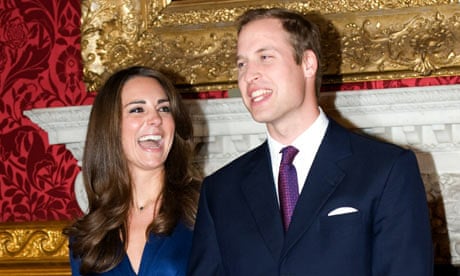Responding to the news of the engagement of Prince William and his Kate, Camilla (Duchess of Cornwall) responded with delight: "It's wicked!" she said. Curiously – Jungians say synchronistically – I was at the same time as hearing this happy news, reading Anne Tyler's The Tin Can Tree, which quotes a review by John Updike, opining that she is "wickedly" good. I like being surrounded by all this wickedness, it reminds me of when my kids were younger, and "wicked" was their favourite term of approbation, meaning what my generation meant by "cool!" In fact the term rather infiltrated my vocabulary – I dodged "awesome!" – and I still use it occasionally, though it makes me slightly embarrassed, listening to myself.
Presumably inversion in the meaning of "wicked" ironically captures the delights that sinfulness can encompass. It may be wicked to eat too much ice cream, or to seduce the farmer's son or daughter, because it is so tempting, so delightful. In this sense, wicked means dangerously pleasurable.
At the same time that this was happening – wait for it: how spooky is this? – I was offered a rare book which, while well out of field for me, was extremely enticing. It is a Bible, published in 1631 by Barker and Lucas, the royal printers, with one of the most famous misprints (if it is that) in the whole of literature. In its citation of the Ten Commandments (Exodus 20:14) we have as Number Seven: "THOU SHALT COMMIT ADULTERY." Given the number of the faithful who believe in a literal interpretation of the holy word, this new injunction was likely to cause the odd misunderstanding. ("I am not repentant, my dear, I am merely obeying God's will.")
Though the mistake is frequently referred to as a compositor's error, it appears unlikely to have been simply an oversight; there seems something purposive about it. Whether this was due to some radical naughtiness, or had a vengeful aspect, it would have to have been the work of some youthful and itinerant printer, who could set the offending type, and hightail it out of town. (Do I feel a short story coming on?).
King Charles I, apprised of the error by the Bishop of London, summoned the frightened and mortified printers to the Star Chamber, revoked their licence, and fined them £300 – some £35,000 in today's money. The Archbishop of Canterbury was scandalised and, in those Puritan times, unwilling or unable to conceive of the mistake as a hoax. He blamed the whole sad affair on shoddy standards in the industry: "I knew the tyme when great care was had about printing, the Bibles especially, good compositors and the best correctors were gotten being grave and learned men, the paper and the letter rare, and faire every way of the beste, but now the paper is nought, the composers boyes, and the correctors unlearned."
The book soon became known as The Wicked Bible. All stocks (a thousand were printed) were destroyed, and sold copies that could be traced were recalled. But months had passed since the Bible was first offered for sale, and the figure of "eleven" surviving copies cited on Wickedpedia is certainly too low. What is clear is that, as assiduously as contemporary copies were hunted down for destruction, copies are now sought enthusiastically for preservation.
What my book's owner wanted to know, of course, was how much it might be worth? He was greatly encouraged by an online reference to an antiquarian firm called Greatsite.com ("World's Largest Dealer of Rare and Antique Bibles") offering a copy of the book for $89,500 (£55,000). Their description of the item is breathlessly excited: "an unspeakably rare collector's item ... only a handful escaped destruction, making them the rarest of the rare. This is the only one for sale in the world." When I emailed them, one John Lawton Jeffcoat III, who sounds more like an evangelist than a dealer, told me that their book had sold, and immediately been replaced by "an even better, totally original" copy, priced at $99,500. The rarest of the rare?
How does one value such a book, given the (relative) scarcity of copies? A dealer's first resource is the database of auction records, which locates five copies sold at auction since 1979. But such data is notoriously difficult to interpret, especially when you can't actually examine the individual copies. The key criteria are these: is the copy complete? Is it in a binding of the period? Were the pages trimmed before binding? What else might it be bound with (it was common to bind religious material such as Books of Common Prayer together with Bibles)? Is it in good condition? Depending on the answers to these questions, the auctioned copies fell within a range of value from as low as $240 in 1979 (another in 1991 at $380) – both in poor condition and lacking some pages – to a top price of $27,000 in 1996, in a contemporary binding but lacking some of the ancillary genealogies and the map. Well, that is some 15 years since the last copy at auction, and you can see where the Greatsite.com dealers are coming from.
But their price is high-end retail, and my collector's copy, if in similar condition, is only likely to be worth, say, half that. Unless, of course, you can locate a private buyer, and sell it to them more expensively. Perhaps someone might wish to give it as a ... ? No, too cruel. Not a royal wedding present, though Prince William's parents obeyed the commandment of the Wicked Bible faithfully enough. The Prince of Wales is after all, our future king, and defender of the faith of the Church of England (or as he revised the phrase, "defender of faith") and would not be amused. He surely wouldn't wish to encourage wicked behaviour, whatever his Camilla might have meant.

Comments (…)
Sign in or create your Guardian account to join the discussion